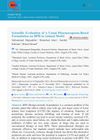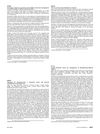 August 2023 in “Clinical, Cosmetic and Investigational Dermatology”
August 2023 in “Clinical, Cosmetic and Investigational Dermatology” Research on the human skin microbiome has grown, focusing on skin health and diseases, with more studies needed on antibiotic resistance and AI applications.
 July 2012 in “Hair transplant forum international”
July 2012 in “Hair transplant forum international” Lifestyle choices like stress, smoking, heavy drinking, sun exposure, and chemical hair treatments might speed up hair loss in people with androgenetic alopecia.
 18 citations,
July 2022 in “Frontiers in Immunology”
18 citations,
July 2022 in “Frontiers in Immunology” Volatile organic compounds can cause inflammation and increase the risk of autoimmune diseases.
 2 citations,
May 2023 in “Current Nutrition Reports”
2 citations,
May 2023 in “Current Nutrition Reports” Eating a Mediterranean diet and taking certain supplements may improve symptoms of PCOS.
 January 2023 in “Revista Da Associacao Medica Brasileira”
January 2023 in “Revista Da Associacao Medica Brasileira” The document concludes that women's health needs a holistic approach, considering all life stages, promoting lifestyle changes, regular exercise, proper diet, and vaccinations, with health professionals playing a key role in education and guidance.
 January 2022 in “IntechOpen eBooks”
January 2022 in “IntechOpen eBooks” Some lesser-known causes of PCOS include autoimmune issues, genetic mutations, and changes in the body's microbiome.
24 citations,
March 2020 in “Cells” Natural small molecules can help treat diseases by activating or inhibiting the Wnt pathway.
 December 2022 in “International journal of preventive, curative & community medicine”
December 2022 in “International journal of preventive, curative & community medicine” PCOS is a common hormonal disorder in women, causing symptoms like acne and irregular periods, and is managed with medication and lifestyle changes.
 61 citations,
May 2010 in “Integrative Cancer Therapies”
61 citations,
May 2010 in “Integrative Cancer Therapies” There is no clear recommendation for using selenium in cancer patients; it may be beneficial to correct low selenium levels before treatment.
 2 citations,
November 2023 in “International Journal of Preventive Medicine and Health (IJPMH)”
2 citations,
November 2023 in “International Journal of Preventive Medicine and Health (IJPMH)” The Unani Pharmacopoeia-Based Formulation significantly improved symptoms of enlarged prostate in rats.
 28 citations,
May 2013 in “The Journal of Steroid Biochemistry and Molecular Biology”
28 citations,
May 2013 in “The Journal of Steroid Biochemistry and Molecular Biology” Testosterone therapy can improve sexual desire and function in postmenopausal women but should be used cautiously and not based solely on testosterone levels.
 24 citations,
October 2012 in “Journal of Ginseng Research”
24 citations,
October 2012 in “Journal of Ginseng Research” Korean Red Ginseng may help improve hair regrowth when used with corticosteroid injections for Alopecia Areata.
 14 citations,
January 2008 in “Gene therapy”
14 citations,
January 2008 in “Gene therapy” Gene therapy shows promise for enhancing physical traits but faces ethical, safety, and regulatory challenges.
 1 citations,
March 2014 in “Journal of The American Academy of Dermatology”
1 citations,
March 2014 in “Journal of The American Academy of Dermatology” Hair care practices and concerns about maintaining hairstyles can reduce how often African American women exercise.
 March 2014 in “Journal of The American Academy of Dermatology”
March 2014 in “Journal of The American Academy of Dermatology” A botanical extract may help manage hair loss from chemotherapy by preventing cell death in hair follicles.
 March 2014 in “Journal of The American Academy of Dermatology”
March 2014 in “Journal of The American Academy of Dermatology” TNF-a may not be as involved in certain types of hair loss as previously thought.
 177 citations,
July 2004 in “The Journal of Sexual Medicine”
177 citations,
July 2004 in “The Journal of Sexual Medicine” Experts recommend thorough medical, sexual, and psychosocial assessments for women's sexual dysfunctions, and suggest individualized treatment plans with regular check-ups. They also mention potential use of estrogen and androgen therapy, but with caution due to safety concerns.
 138 citations,
November 2015 in “Journal of Pharmacology and Experimental Therapeutics”
138 citations,
November 2015 in “Journal of Pharmacology and Experimental Therapeutics” Protoporphyrin IX is useful in cancer treatment but can cause health problems if not properly regulated.
 86 citations,
May 2011 in “Journal of The American Academy of Dermatology”
86 citations,
May 2011 in “Journal of The American Academy of Dermatology” How bad a woman's hair loss is doesn't always match how it affects her happiness and daily life.
 50 citations,
February 2018 in “Biomedicine & pharmacotherapy”
50 citations,
February 2018 in “Biomedicine & pharmacotherapy” Ginseng may help treat cancer and reduce treatment side effects, but more research is needed.
 41 citations,
September 2005 in “Wound Repair and Regeneration”
41 citations,
September 2005 in “Wound Repair and Regeneration” Hydrogen peroxide can cause scars by changing healing processes and increasing certain protein levels.
 38 citations,
February 2012 in “Supportive Care in Cancer”
38 citations,
February 2012 in “Supportive Care in Cancer” Skin problems like acne, dry skin, and nail and hair changes are common in patients taking EGFR inhibitors.
 36 citations,
January 2014 in “The Journal of Sexual Medicine”
36 citations,
January 2014 in “The Journal of Sexual Medicine” Testosterone may help increase sexual events for women with low libido due to antidepressants.
 29 citations,
September 2017 in “Oncology and therapy”
29 citations,
September 2017 in “Oncology and therapy” The document provides advice on how to recognize and treat skin-related side effects of cancer drugs known as EGFR inhibitors.
 11 citations,
October 2001 in “Dermatologic Clinics”
11 citations,
October 2001 in “Dermatologic Clinics” The document concludes that DAB389-IL2 is promising for treating refractory cutaneous T-cell lymphoma, but more research is needed on its effectiveness and side effect management.
 9 citations,
February 2019 in “BMC cancer”
9 citations,
February 2019 in “BMC cancer” M30 is a promising treatment for preventing hair loss during chemotherapy.
 6 citations,
October 2016 in “Contraception”
6 citations,
October 2016 in “Contraception” The medication cyproterone acetate/ethinylestradiol is usually prescribed correctly for acne after other treatments don't work.
 6 citations,
December 2013 in “Journal of Cutaneous Pathology”
6 citations,
December 2013 in “Journal of Cutaneous Pathology” Certain immune cells are more common on the top of the head and might help predict or treat common hair loss.
 3 citations,
May 2018 in “The Journal of the American Animal Hospital Association/Journal of the American Animal Hospital Association”
3 citations,
May 2018 in “The Journal of the American Animal Hospital Association/Journal of the American Animal Hospital Association” Deslorelin implants successfully treated hair loss in two male Keeshonden dogs.
 2 citations,
January 2012 in “InTech eBooks”
2 citations,
January 2012 in “InTech eBooks” Chemotherapy often causes hair loss, which usually grows back within 3 to 6 months, but there's no effective treatment to prevent it.




























